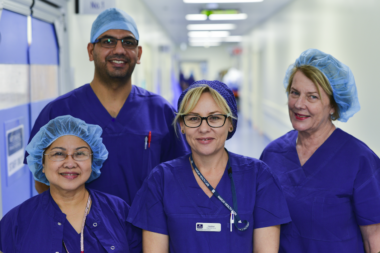- New resource to help people ‘bowel prep’ for a good colonoscopy.
- Inadequate bowel preparation observed in 7%[i] of colonoscopies, which can lead to repeat procedures impacting waitlists.
- A good bowel prep is critical to detecting bowel cancer or preventing it.
Wednesday, 28 February 2024, Sydney: A good bowel prep is essential to a good colonoscopy and critical to detecting bowel cancer or preventing it through the detection and removal of polyps.
In Australia, inadequate bowel prep is observed in around 7% of all colonoscopies. With more than 900,000[ii] colonoscopies performed annually in the country, this can equate to as many as 63,000 inadequate bowel preparations leading to poor or cancelled colonoscopies.
That’s why Bowel Cancer Australia has launched a new resource (bowelprep.au) to help people ‘bowel prep’ prior to colonoscopy. Inadequate bowel prep can lead to the cancellation of a colonoscopy and having it rescheduled, which impacts waitlists. If the colonoscopy does proceed, it can be less effective as polyps and bowel cancer are more likely to be missed due to poor visibility.
The new bowel prep resource provides a list of easy steps for patients to follow, reminders at each step, and videos to help explain the bowel prep and white / low-residue diet. Patients can amend the timing of steps as advised by their colonoscopist, if needed.
The resource is configured for every bowel prep solution currently available in Australia.
“A poor bowel prep makes preventing or detecting bowel cancer more difficult,” said gastroenterologist A/Prof John Ding. “If you don’t have a good bowel prep, it renders your colonoscopy less effective, as polyps and bowel cancer are more likely to be missed due to poor visibility.”
“Ultimately, poor visualisation of the bowel means the procedure may need to be repeated, with the patient returning to the end of what can be a very long waitlist,” he explained.
“We really need people to complete their bowel prep properly to give the colonoscopist the best possible chance of detecting the presence of polyps or bowel cancer,” he added.
But what does bowel prep entail? Bowel prep is the process of emptying and cleaning out the large bowel in preparation for colonoscopy via the intake of oral solution containing strong laxatives.
Patients are given instructions on how to complete the prep, as well as a list of what they can and cannot eat or drink.
“Three days before you have your colonoscopy, you need to stop eating foods such as raw vegetables, seeds, nuts, and popcorn, as these foods take longer to digest,” said Dr Ding. “Then, the day before your procedure, you need to stop eating solid foods (after breakfast) and start the bowel prep.”
“Typically, 12-18 hours prior to colonoscopy, you begin drinking the bowel prep which triggers bowel-clearing diarrhoea. You may feel full or bloated, and you must be within easy access of a toilet, as you will need to go frequently and likely urgently,” he explained.
“The type of bowel prep isn’t nearly as important as how well you do it,” he said. “However, splitting the prep between the evening before and the morning of the procedure, regardless of the brand, does seem to make for an even better colonoscopy.”
All you need after accessing the resource, is soft toilet paper, some wet wipes, cream to ease the irritation (it can get a bit uncomfortable from excessive wiping) and creative ways to pass all that time you’ll be sitting on the toilet.
-ENDS-
For further information or to arrange an interview
with a medical expert, please contact:
Laura Ng — Bowel Cancer Australia
0405 911 202
About Bowel Cancer Australia
Bowel Cancer Australia is a 100% community-funded national charity dedicated to championing what matters most to people impacted by bowel cancer and empowering everyone affected to live their best life. We are committed to challenging perceptions, overcoming barriers, and creating meaningful change across the care continuum through advocacy, awareness, and integrated research to improve access to personalised treatments and patient-centred care.
[i] Ow TW, Sukocheva OA et al., Quality of colonoscopy performed by medical or surgical specialists and trainees in five Australian hospitals, World J Gastrointest Endosc. 2022;14(11):672-683. doi: 10.4253/wjge.v14.i11. https://pubmed.ncbi.nlm.nih.gov/36438878
[ii] Australian Commission on Safety and Quality in Health Care, Colonoscopy Clinical Care Standard, January 2020. https://www.safetyandquality.gov.au/sites/default/files/2020-04/colonoscopy_clinical_care_standard_updated_2020.pdf


